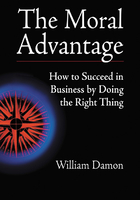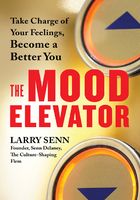An Arizona desert; pre-dawn. Total silence. CAMERA PANS ACROSS the shadowy landscape, PAST the ruin of an ancient temple wall. A man's VOICE speaks.
"All these happenings-each one of them-are evidences of a greater truth. Traces of the ultimate reality."
A VOICE responds; that of Robert Allright, our protagonist. "Which is-?" he asks.
CAMERA has STOPPED before a man-made aperture in the temple wall. An instant after Robert's voice has spoken, sunlight breaks across a distant hilltop and our eyes are flooded with the blazing light. The screen is filled with it.
We see, then, what will be the logo for our story-a pair of sculpted bronze hands, reaching upward, fingers bowed, palms facing. Between them-floating, untouched-is a crystal, which seems, at first examination, unlike the regular shape of a prism, devoid of any specific shape. It presents one uneven, triangular face and an adjoining five-sided one. The three-sided face reveals nothing but unmarked glass. The five-sided face encapsulates what appears to be the skull of some impossible to describe creature. Turning the crystal reveals two more multi-sided faces. The jewel-like skull does not appear in either one of these.
TITLE: THE LINK.
A moment. Then, abruptly, we are looking at a window rivuleted by steady rain. MUSIC plays, its source unknown: a familiar song from 1950. CAMERA PULLS BACK. Pale, white curtains hanging at the window. CAMERA TURNS. A living room in 1950, dim, untenanted.
The rain sound should be comforting; so, too, the music. There is something wrong though, virtually intangible but wrong. CAMERA MOVES toward the front hall, starts to pick up speed a bit.
ROBERT FRANCIS ALLRIGHT turns his head on a pillow, opens his eyes. The MUSIC fades. A dream.
He stares a moment more, then turns his head a little further; smiles.
His black Lab sits beside the water bed, looking at him. Robert reaches out to stroke the dog's head. "Hi-ya, Bart," he murmurs. Bart's tail thumps against the floor. "What do you dream, Bartie?" Robert asks.
He rises slowly, stretches, groans. The back again. "Oh, boy." He winces; cannot raise his left arm all the way.
He moves into the bathroom, twisting on the cold water faucet of the sink. He groans his a.m. groan at the pitiful water pressure in his house, then washes off his face and stares into the medicine cabinet mirror at the reflection of his dripping features.
An abrupt SHOT of his dream, remembered: the living room, the rain, a fragment of the 1950 song. Then back to his reflection. HOLD.
CUT: Robert in a blue running suit and shoes, doing stretching exercises. Next we see him moving through the woods with Bart. His eyes glaze as they run together. He begins to mumble to himself.
"The girl was nineteen, born in California-"
We see the girl, dressing in a dark outfit. "She was dressing to attend a funeral when an overpowering urge came over her," Robert's voice narrates.
The girl's movements get more and more erratic. She is obviously distressed.
We see her getting on a bus. "Instead of going to the funeral, she boarded a bus," says Robert's voice. The girl sits down, looks at her wristwatch uneasily. "She had to see her mother."
SHOTS of the moving bus, the girl. She grows increasingly disturbed. Arriving at her destination, she almost leaps from the bus and runs along the small town street.
Arriving at her parents' furniture store, she enters hurriedly and finds them taking a break in the front window, sitting on chairs. They look at her in startlement. What is she doing there?
Her lips move, Robert's voice speaking the words. "'I'm hungry, let's get something to eat', she said." Her parents smile, her manner is so peculiar. Urgently, she gets them up and moves them toward the back room, OUT OF SCENE.
A large, black sedan, out of control, appears in the street, skids sharply, jars across the curb, the sidewalk, plows into the window of the store, demolishing everything.
"Another five seconds and her parents would have been crushed," says Robert's voice.
He is back at the house, muscles loose. He showers, dresses, makes a pot of coffee, feeds Bart who is wheezing as he sprawls on the kitchen floor. "What's the matter, pal, you getting old?" Robert asks him, stopping to stroke the Lab's head.
Minutes later, he is in his office, Bart lying in a cushioned basket by the desk. Robert speaks into the microphone of his word processor. As he dictates, the machine types words onto the screen.
"What made this girl, ignoring all else, board a bus and rush to her parents' furniture store to take them from the front window seconds before that car came crashing in?" He completes the story.
"Call it extra-sensory perception. Psychic foresight. Psi. The words are unimportant. What matters is a remarkable human capacity for knowing what can only be defined, by standard scientific means, as the unknowable."
As he lists these remarkable capacities, we see brief SHOTS of coming scenes in which these psychic faculties will be explored. "Telepathy. Precognition. Clairvoyance. Psychokinesis. Healing. Psychic crime solving. Out-of-the-body experiences. Haunted-"
The telephone rings. Robert grumbles, switching off the processor and picking up the telephone receiver.
"Is this Robert Allright?" asks a voice.
The call is from Hollywood, a young producer named ALAN BREMER. He got Robert's number from an editor at Robert's publishing house. He is "crazy" about Robert's latest book THINGS WITHOUT EXPLANATION. He wants to make a three or four-hour film for t-v, using the book as source material. He'd like to include everything in it but that, of course, would be impractical.
What he sees as viable (and "fascinating!") is a film recounting the historical background of parapsychology, the events leading up to the world of psi today. Would Robert be interested in preparing an outline? He is thinking "in the neighborhood" of fifty thousand dollars.
Robert looks at Bart, a hand across the telephone mouthpiece. "Nice neighborhood," he murmurs.
He indicates his interest. "Great!" enthuses Bremer. "I'll talk to your agent right away! Can you fly out to the coast tomorrow?"
Robert hesitates; he isn't used to functioning with such abandon. But he allows seeing as how it's possible.
"Sensational!" cries Alan Bremer.
Robert hangs up, looking at Bart. "Well, what do you know about that?" Bart's tail thumps on the cushion.
Mid-afternoon. Robert prepares to leave the house. He dresses, sets the timer on Bart's automatic feeder, pockets his hand-size bio-feedback control and drives off in his impeccable 1975 Mercedes. An unhappy Bart watches him go. He likes to ride with Robert.
En route to the city, listening to a cassette of Mahler's sixth, Robert begins to muse aloud regarding Alan Bremer's plan.
"The historical background of parapsychology?" he mutters dubiously. "The events leading up to the world of psi today? Is he insane? Does he have any idea of all the material that covers?"
We see brief SHOTS of sequences to come concerning these events as Robert's voice recounts them. "Early psi. Mesmer. The Fox Sisters. D.D. Home. Nettie Colburn. Palladino. Mrs. Piper. Mrs. Leonard. Margery. Edgar Cayce. J.B. Rhine. Good Lord."
We are back in the car with Robert as he groans. "Maybe I should just forget it."
Reaching Manhattan, Robert parks on the outskirts (to avoid inner city traffic) and cabs to an apartment house on the East side near the 30's.
There, responding to a previously phoned request, he sees his father DR. FRANCIS KENNETH ALLRIGHT, 69, a retired professor of Archeology, formerly at Columbia University.
His father is a man possessed by anger and frustration, a condition exacerbated by his chronic inability to express emotion.
Something has occurred to him which, in essence, has defied a long-lasting conviction in his work. There is no time to start over again, check it all out. Consequently, rage consumes him-rage at his years, his frailties, the fate which makes it impossible for him to continue working.
He and Robert have never had an open relationship. Francis Allright has been unable to communicate with any of his three children but least of all with Robert.
So when, imperious and cold, he informs Robert that he wants him to go to Arizona and continue his project there, the all but open demand scarcely falls on fertile soil.
Robert tries to be polite but tells his father that he cannot leave his own pursuits. He has magazine and book commitments, a probable commitment on the coast now. "Why not ask John?" he suggests. "He even lives within a reasonable distance of-"
His father interrupts impatiently. "If I wanted John to do it, I would have asked him," he says. "John is unqualified."
Robert gestures haplessly, forcing a smile. "So am I," he says. "You know-"
"This is important," his father interrupts again. Unlike Robert's "journalistic" projects which betray a constant tendency to "backslide" into "your mother's illogical world."
Robert tenses. He resents the contempt with which his father holds the memory of Robert's mother. "Can we leave her out of this?" he asks.
"I know you think her to have been a saint," his father snaps. "She was not. She was a woman crippled by untenable delusions."
"I didn't come here to listen to that," Robert says.
His father waves that off. "I'm going to show you something," he says.
Robert stands. "I'm sorry," he tells his father. "I really don't want to see anything or hear any more."
A few more heated exchanges, then Robert is gone. His father stands in the living room of his small apartment, seething with the fury of a man who believes that his life's work is being rendered meaningless.
He turns and moves to his desk, picking up a small crystal. He stares at it with almost hatred, finally setting it down with a sudden, fierce movement.
He had shown the crystal to Edgar Vance, a long-time associate at the Percival Laboratories. Vance had reacted strangely to the analysis. The crystal, he said, consisted of a number of elements which he had not run across in more than fifty years at the laboratory.
For that matter, the crystalline structure consisted of elements that existed no place on earth.
The crystal refracts a beam of sunlight, casting spectrum colors on the sheet of white paper on which it lies, a torment to the aging man.
Driving home, Robert unconsciously removes the bio-feedback control from his sportcoat pocket, holds it to his left ear and tries to will down the faintly pitched howl. It is not easy.
The visit to his father has upset him.
Reaching his community, he stops at the residence-office of veterinarian AMELIA BROOKSTONE, an attractive spinster in her fifties and a friend of Robert's. Can he leave Bart with her while he goes to Los Angeles?
Of course, she says. We see, from her collection of books, records and art works, part of the rapport between the two. They often go to plays, concerts and art shows together.
Arriving home, Robert switches on his telephone answering machine. The agitated voice of ex-wife BARBARA asks him to return her call as soon as possible.
He does immediately to hear that "things" with Ann are still distressing. "You know what I mean," she emphasizes. "This is your kind of thing."
Robert tenses, keeps his voice as even as he can. He has to fly to Los Angeles tomorrow. As soon as he gets back, he'll come over and speak to Ann.
"Please do," says Barbara tightly, hanging up.
Later. Robert packing, questioning his trip to L.A. on the morrow. Sighing, he inquires of himself, "What am I getting into?"
SUDDEN CUT. A trap door opening overhead. A tall man climbing down a ladder to an underground, dirt-walled chamber. Torches lit and placed in brackets on the wall. The flickering illumination shows a handsome Indian face, a man in his forties.
Holding an odd-looking dagger in his right hand, he performs a soundless ritual. In the wavering light, he faces north, outlining a star-like figure in the air with the dagger point. He "erases" the figure, turns to the east, using the dagger point to outline the figure once again.
He erases it, turns to the south, repeats the unseen outline with the dagger point. Erases that, turns to the west, outlines the figure for the fourth time.
Then he speaks in Hopi; after several sentences, we hear the words in English.
"-Great Spirit who is the life that is in all things. The Creator of all things. Grant this request." CAMERA MOVES IN SHARPLY on his lips as he whispers. "Show me the one who is to come."
CUT TO Robert on the airplane as it sets down in Los Angeles. A driver picks him up and he is limoed to the studio where Alan Bremer works.
En route, he has the first of what will constitute a "running gag" throughout the story. He imagines what his meeting with the young producer will be like.
We see his fantasy. Bremer, five-feet tall, in jodhpurs and beret, a foot-long cigar clamped between his teeth, whacking at his giant desk top with a riding crop in an office resembling the inside of a Hapsburg hunting lodge.
Immediately after, he is at the studio and ushered into Alan Bremer's modest office. Bremer rises, smiling, hand outstretched, a pleasant-looking young man in his thirties. He welcomes Robert, seats him, Robert glancing at a large wall photograph of Bremer's wife and two daughters.
The producer reaffirms his enthusiasm for the project, his desire that everything in the book could be used-"all that great stuff" about Egypt and the Mayans, Stonehenge, Atlantis, UFOs, The Abominable Snowman, the Loch Ness Monsters, etc.
Robert smiles. "I think we'll have more than enough even confining it to the area you mentioned."
Alan nods, his gaze intent on Robert. "You think the rest would make it too much?"
"Not only too much but disjointed," Robert says. "Those items don't add up to anything. At least there's some kind of continuity in the history of psi."
"Right," Alan gestures concedingly. As to details: where does Robert want to work on this?
"Oh, at home," Robert says immediately. "All my material is there."
Right, says Alan. That will work out fine since Peter Clarke and Cathy Graves are stationed in the New York area as well.
Robert's face goes blank.
"Didn't your agent tell you about them?" Alan asks, surprised. "They're parapsychologists from England on a one-year loanout to ESPA in Manhattan. They'll be your technical advisors."
Robert hesitates, then shrugs. It doesn't matter to him; it's a job, no more.
Alan stands. "Come on, I'll introduce you to her. She's watching them shoot on the soundstage; we had lunch together."
As they leave the office, Robert sees a framed motto on the wall which reads THAT WHICH YOU THINK BECOMES YOUR WORLD. "I like that," he says.
"Applies to everything," Alan responds.
Exiting the building with Robert, Alan says, "We've got to include the names of all the famous people interested in psi. Einstein. Edison. Newton. Lincoln. Freud. Houdini."
Robert smiles. "I think Houdini was more interested in knocking it down than supporting it," he says.
"Right," agrees Alan. "Where would we start?"
Robert thinks a moment, then replies. "Some early incidents in psi might be appropriate."
His voice narrates as we see some incidents from the early days of psi: King Croesus of Lydia testing the predictive power of his court seer; a witnessed levitation by St. Theresa; an incident from Swedenborg's life as recounted by Kant; Mesmer and patients in his bizarre "healing" chamber; a leg amputation using, for the first time, "neuro-hypnosis" as an anesthetic; Baron Reichenback's investigation of so-called "sensitives."
"Great," says Alan. "That should get us off in style."
Entering the soundstage, Robert has another fantasy: Cathy Graves, tall and gaunt, with hawk-like features, thick-lensed glasses, wearing heavy tweed, her throaty voice heavily accented as she greets him with, "Ah! Mr. Allright! So! We're to be shipmates on the sea of psi, as t'were! Haw!"
He is more than slightly taken back by Cathy Graves' appearance; she might well be starring in the film she's been watching being shot. Alan introduces them, then leaves them "to get acquainted" as he goes to consult the film's director.
Their "getting acquainted" is something less than satisfactory. Robert tries to be polite and pleasant but Cathy Graves appears to have pre-judged him sight unseen. She immediately makes it clear that she believes the film, if it is to be "of any import whatever", must be strictly informational, scientific in approach. She is not interested in "pandering" to superstition.
Robert eyes her with a faint smile, judging her to be an intellectual snob as she tells him of her objections to the "assumed fringe" subjects of parapsychology; i.e. survival after death, reincarnation, astrology, palmistry, pyramid power, UFOs, the Bermuda Triangle et al.
"There is no methodology in these," she states. "I trust those aspects of your book will be avoided."
The faintest icing of his smile betrays his reactions to her.
Alan returns with a group of people-the director, actors, camera man, etc; he calls together further members of the crew. "Robert, tell them about the Great Seal," he says.
Robert is trapped. Turning from Cathy, he tells everyone to take a dollar bill out and look at it.
Analysis of the Great Seal of the United States, he points out, indicates that the Republic's founders were believers in the "ancient mysteries", the Seal disclosing a number of occult symbols.
"For example," he explains, "the unfinished pyramid with the All-Seeing Eye above it on the back side of the bill is an obvious rendition of the Masonic emblem.
"The mystical number 13 appears in the sacred emblem above the eagle, 13 stars in its center. The motto E Pluribus Unum contains 13 letters as does the reverse inscription Annuit Coeptis. The eagle clutches, in its talon, a branch bearing 13 leaves and 13 berries. In its left talon is a sheaf of 13 arrows and the face of the pyramid, exclusive of the panel containing the date, consists of 72 stones arranged in 13 rows."
As he continues telling the intrigued group about this, he glances at Cathy.
She is not intrigued.
He turns away from her. He does not intend to lose much time with her regarding the project.
LAX, the following morning. Entering the 747, Robert discovers that Cathy is on the same flight, her seat in a different section of the first-class section. As they pass, she smiles and says good morning. He returns the greeting politely.
The plane takes off and Robert removes a yellow legal-size pad from his attaché case, some notes, a mechanical pencil. He begins to write-and we hear his voice speaking the words aloud, "It is generally accepted that the "birth" of Spiritualism which was, in turn, the origin of modern parapsychology took place on the night of March 31, 1848 in Hydesville, New York, at the home of Mr. and Mrs. John D. Fox."
We see the house, moonlit, trees and bushes shaking in the wind. We are inside then, hearing noises in all parts of the house, above and below. Sporadic and unsettling noises. Raps and knockings. Loud thumps. What might be footsteps. The apparent noise of moving furniture.
We move upstairs. Mr. Fox lights a candle and attempts to comfort his wife; she is sick with fear. Are they going to have to move? They should have listened to the rumors about the house's former tenant leaving because of "mysterious noise". How much more of this can they endure? The sounds have been dismaying them for almost a month now.
Mrs. Fox shivers in her husband's arms. "I pray that Kate and Margaret are sleeping through it," she murmurs.
In the girls' bedroom, Kate, 7 and Margaret, 10, are definitely not sleeping through it, huddled side by side in the dark room, arms around each other, listening to the rapping noises-so severe they make the bedstead jar.
Kate attempts to snap her fingers in time with the noises.
"Don't," pleads Margaret.
"Maybe it's a restless spirit," Kate suggests. "Maybe we can talk to it."
"No," whines Margaret.
But Kate continues and, to their open-mouthed shock, the rappings seem to answer the rhythms of her fingers snapping.
A historic moment then. Kate, on impulse, suddenly says, aloud, "Mr. Splitfoot, do as I do," and claps her hands.
The girls cry out in unison as the rappings instantly reply with the same number of sounds. Margaret, eyes as wide as saucers, says, "No, do just as I do. Count one, two, three, four," clapping her hands together four times.
Again, the girls cry out, recoiling into their pillows with delicious terror as the rappings answer-one, two, three, four.
Their parents rush in with a candle, frightened for their daughters' safety. Hearing what the two girls say, their words tumbling out in terrified excitement, Mr. Fox asks the rappings to tell him his daughters' ages from the oldest to the youngest.
Mrs. Fox gasps in dread, a trembling hand across her mouth as the rappings instantly reply, giving the correct ages, pausing between each for separation. They include the age of their oldest daughter Leah who no longer lives at home.
Then a final age is given-three-and Mrs. Fox begins to sob.
There had been another daughter who had died at that very age.
Mr. Fox cannot stop questioning now despite the frightened pleadings of his wife.
"Is this a human being that answers my questions so correctly?" he asks.
No sound.
"Is it a spirit?" he asks. "If it is, make two raps."
They all gasp, chilled, as two raps loudly answer.
"In this way," Robert's voice narrates, "it was discovered-and accepted by the family-that the spirit was that of a thirty-one year old man murdered in the house, his remains buried in its cellar.
"Thus began a unique event which marked-though no one knew it at the time-the birth of a field of study which was to sweep the world."
We see the tale continue. Digging is commenced in the cellar, Robert's voice describing how the "spirit" had described its death-on a Tuesday night at midnight, his throat cut by the owner of the house, his body dragged downstairs and buried ten feet down in the cellar floor. Motive? Five hundred dollars in his possession.
Water seepage ends the digging. It continues in the summer. At the five-foot level, a plank is uncovered, below it charcoal and quicklime, finally human hair and bones.
"From that day forth," says Robert's voice, "the phenomena took on the character of a genuine haunting."
We see it happening: the sound of a death struggle, throat gurglings, the dragging of a body across the upper floor and down the stairs, the sound of digging in the cellar. Mrs. Fox's hair turns white. The family can no longer endure it and, "Kate was sent to the house of an older brother, Margaret to the house of her older sister.
"The phenomena continued in both places," Robert's voice narrates.
It is especially bad where Margaret is. We see the husband of Margaret's sister exposed to the first recorded "poltergeist" episode in the United States, objects constantly thrown at him. Pins are stuck into all of them as they pray. Caps are pulled from their heads, combs jerked from their hair. What sounds like heavy artillery is heard on the roof, heard for miles around.
Finally, a visiting friend attempts to converse with the rambunctious spirit and, with deafening raps, a message is spelled out. Robert speaks it aloud.
"Dear friends, you must proclaim this truth to the world. This is the dawning of a new era. You must not try to conceal it any longer."
And so the floodgates opened, Robert writes on the pad. He looks around, the cabin darkening; they are about to show the film. He switches on the overhead light.
A tap on his shoulder. He looks up to see Cathy. Would he like to go up to the lounge and chat?
He hesitates. "Please," she smiles. "There's something I'd like to say."
He follows her up the winding stairs and settles on a couch beside her. She wants, she tells him, to apologize. She knows how badly she behaved yesterday; it was uncalled for. Doubly so in light of her having actually looked at his book the night before; Alan had given her a copy. Unlike what she had-"with disgraceful prejudice" she says-assumed it to be (a sensationalized potboiler churned out to make money), she'd found it to be done with scrupulous objectivity and intelligence; even noticeable caution.
"I feel a total fool for acting as I did," she says.
Robert smiles. "No harm done." He is impressed that she had taken the trouble to re-examine her behavior.
"As a matter of fact," she adds, "the book is so well done I wish that you'd included less material and gone into it in more detail."
Robert shrugs.
"What were you writing on the pad?" she asks.
He tells her and they talk about the Fox Sisters; a prime example of telekinesis, she observes, a prototypical poltergeist event.
"You don't believe it was a spirit then," he says, knowing the answer.
"Of course not, do you?" she asks in surprise.
"I have no opinion either way," he tells her.
"You don't?" She sounds surprised again. Evoking no response from him, she continues with the Fox Sisters incident. They did recant in later years, she says, admit to fraud, claiming that they make the noises by "cracking their toe joints". That, of course, is ridiculous, she adds. The phenomena were too extensive for that.
"They also denied their recantation," Robert reminds her. And, of course, the "toe-joint cracking" thesis is absurd-although they might have done exactly that on occasion in order to impress clients.
Still, on her deathbed, when she couldn't move a muscle, Margaret Fox involuntarily created rappings in the ceiling, walls and floor of the bedroom.
"A sad story actually," he concludes. "When they recanted, both sisters were alcoholics, broken by the stresses to which they'd been exposed to by their gifts."
He makes a scoffing sound, almost bitter. "Gifts," he says.
She looks at him with curiosity, wondering what lies below the surface of this pleasant, somewhat enigmatic man.
The ice broken now, they engage in conversation, first regarding ESPA which stands for Extended Sensory Perception Association; "all of us believe that psi is an expansion of the five senses, not a sixth," she tells him.
She says again-this time with more discretion-that the history of psi, while undeniably colorful, is pretty much irrelevant these days. All the early years of research were consumed attempting to prove that what was happening was actually occurring, and that primarily to verify survival after death.
Today, the research is more inclusive. That the phenomena exist is no longer an issue to those in the field. They are more concerned with their significance.
As for herself, she states what Robert has already presumed to be her belief: that all psychic phenomena are attributes of man's physical system, no spiritual correlation whatever.
"Fine," says Robert. He is all for that. Superstition out, science in. "We have no argument," he tells her. He only means to present, in his outline, some of the more intriguing highlights of psi's past; no harm in that.
Cathy smiles. "Of course not." There are some incredible stories and she looks forward to working with him on the proposed film.
Soon they are engrossed in personal conversation.
She learns what we already know and, in addition, that his mother died when he was six and that he was wounded in Vietnam in 1968.
We continue to sense that there are things about his past which he protects most carefully.
He learns, from her, that she is married to Harry Graves, a professor of Biology at a London college.
Robert has a brief fantasy about him: a balding man with bottle-bottom pince-nez glasses over berry eyes, a white lab coat on as he hovers above a dead frog, scalpel poised, commenting in a dry as dust voice, "We will now excise the gazongas from this filthy little beggar."
RETURN to Robert, a faint smile on his lips.
"What?" she asks.
"I'm sorry," he apologizes. "I was thinking of something else."
He further learns that her father is world-famed physicist Dr. Alexander Robertson, her mother a well-known psychologist-author, her older brother also a physicist who works with her father.
"I'm impressed," he says. "You must have to go some to live up to that."
A faint expression on her face betrays the truth of that.
We learn, as Robert casually speaks of some minute "trivia" fact about the plane, that he is the author of three well-selling books entitled THINGS EXPLAINED, MORE THINGS EXPLAINED and OTHER THINGS EXPLAINED.
"My father loves those books!" enthuses Cathy. "He's forever reading them in the loo."
Robert chuckles, taking that for praise.
"So that's the genesis of THINGS WITHOUT EXPLANATION," she observes. He nods. "Of course we both know everything can be explained with proper knowledge," she adds.
He shrugs. "Assuming that the proper knowledge shows up," he responds.
By the time they reach New York they have become quite friendly with each other; it is a given that, both good looking, they are attracted to each other physically. When the plane lands, Robert walks her into the terminal where the mood is dispelled by HARRY GRAVES waiting there to pick her up; he, of course, bears not the faintest resemblance to Robert's mini-fantasy, a pleasant-looking man in his late thirties, wearing casual clothes.
He shakes hands with Robert as they meet, explaining, when Robert mentions it, that he is on a brief vacation from his teaching duties, visiting Cathy "in the Colonies." Robert smiles and nods.
Then they are gone and Robert walks to his parked car. He drives to Connecticut and picks up Bart who is a wriggling testimony to joy at seeing his master. Amelia tells him that he might keep an eye on Bart's breathing; it's a little strained at times.
At home, Robert finds two messages on his answering machine; one from his literary agent asking him to call and tell him about the trip, the other from his father. Sighing, Robert hesitates, then dials his father's number.
"Have you reconsidered?" asks his father stiffly. "This is quite important, Robert. Quite important."
"I'm sorry, Dad, I really can't," he says. "I have too many-"
"Your decision, of course," his father interrupts. "You're making a mistake however. What you don't-" he hangs up.
"Oh, God," Robert groans and, unaware of it, removes the bio-feedback control from his jacket pocket, holds it to his left ear.
It howls.
Early morning. Robert getting up. His aching back, the left arm. Lousy water pressure in the bathroom. Stretching exercises. Running with Bart who wheezes on their return. Robert sitting by the dog, his arm around him. "What's the matter, pal? You getting old? You? Not you, Bart. You're a young guy. Sure you are." The thumping tail, the black face nuzzling his.
Later. Robert at his desk, dictating, CAMERA MOVING IN ON the words appearing on the processor screen.
"Following the events at Hydesville, physical phenomena began to sweep the country."
We see it as his voice narrates. "Table tiltings. Séance rooms replete with rappings, thumpings, even spirit voices. By 1853, it was estimated that there were 40,000 spiritualists in New York alone.
"But it was not professional mediums who popularized the cause at first. Table turning at home became the rage in all parts of the country as well as in England and on the Continent. Tables would rotate and make other movements without visible control, all the movements accepted as the answering of questions from 'Beyond'.
"A wave of fascination spread across the western world, the number of adherents to the new faith mounting to more than ten million.
"The first great psychic to appear upon this active scene was Daniel Dunglas Home."
We see Home sitting with various notables, a young man of striking appearance, face shaven except for a mustache, hair bushy and curly.
"Among those who had sittings with the young Scotch medium were William Thackeray, Anthony Trollope, Elizabeth Barrett Browning, Alexander Dumas and most of the crowned heads of Europe including Napoleon the Third.
"What makes this man unique in the history of psychic phenomena is the volume of testimony regarding his feats over a period of some forty years. Despite extreme hostility by critics, he was not once shown to be fraudulent."
The exterior of a London townhouse. "A gathering at the home of Lord Adare including Mr. Charles Wynne, Mr. Saal, Mr. Hurt and Mr. and Mrs. Jencken. The most famous of D.D. Home's many demonstrations."
CUT IN. Four men around a grand piano, pushing down on it with all their strength; nearby, D.D. Home, arms raised.
The piano floats two inches from the floor.
"Push it down," says Home. They try in unison. The piano rises higher. "Try," says Home. They do as much as possible. In vain. The piano rises steadily until it hovers above their heads.
Then, as Home lowers his arms, the piano sinks to the floor without a sound.
The drawing room is not brightly lit but it is not at all dark. A fire burns in the grate. Several lamps cast soft illumination.
Home does something now which is, by any physical standard, impossible.
He grows.
He is a man five foot ten inches in height. Yet, standing beside Mr. Jencken who is noticeably taller, he begins to rise. His feet remain planted on the floor but, with audible crackling noises, Home extends himself.
Soon the top of his head is higher than that of Mr. Jencken. Before the incredulous gaze of the sitters, Home keeps growing until he is six foot, six inches tall.
"Daniel, will you show how it is?" asks Lord Adare.
Home unbuttons his coat to reveal a space of six inches between his waistcoat bottom and the waistband of his trousers. Moreover, he has grown in breadth as well, a veritable giant.
He then diminishes, regaining normal height and breadth.
He is weakened. It is a feat which drains him; he feels nauseous. He sits, the others watching in silence.
He regains himself and moves to the fire, picking up the poker from its rack. He jabs the end of it into the coals, causing them to flare. He then puts down the poker, draws in a deep breath and reaches into the fire.
He lifts out a red-hot ember twice the size of an orange.
Carrying it to the amazed group, he shows it to them. They wince, drawing back from its heat. He returns the ember to the flames, comes back to display his hand. No burns. It is un-scorched, not blackened in the least.
Returning to the fire, he stirs the embers into flame again-this time with his hands-and, kneeling, places his face among the burning coals, moving it about as though bathing in comfortable water.
He straightens then, picks up the same large burning coal he previously handled and returns to the group, blowing on the coal to make it brighter.
"I want to see which of you will be the best subject," he says. "Ah! Adare will be the easiest because he has been the most with Dan." (It is Home's "control" who presumably speaks through this sitting.)
"Put it in mine," says Jencken.
"No, no, touch it and see," Home tells him.
Jencken does and gasps, burning the tip of his finger. Home then holds the coal within four inches of Mr. Saal's and Mr. Hurt's hands. They cannot endure the heat and pull their hands away.
Home turns to Lord Adare and says, "If you are not afraid, hold out your hand."
Adare does so and Home makes two rapid passes over the hand, then puts the burning coal in it.
"Good Lord," murmurs Adare. The others stare at him. "It feels scarcely warm," he says.
Home laughs and takes the coal away, returning it to the fireplace.
He whispers then that, "the spirits are arranging something special; do not be afraid and, on no account, leave your places."
He moves to the window and opens it wide, then leaves and walks into the adjoining room where they hear the window being opened there. Several moments pass.
Abruptly then, Home is standing upright outside the window of the room in which the group is sitting.
"Oh, my," says Mrs. Jenckens as Home "walks" into the room quite calmly, sits and laughs. "If a policeman had been passing, imagine his astonishment if he had looked up to see Dan turning round and round along the outside wall of the house," he says. He thanks them for not having moved.
Lord Adare walks into the other room and finds the window raised scarcely a foot. Returning to the sitters, he comments on this and Home rises. "Come and see," he says.
Adare accompanies him and Home re-opens the window the same amount of space.
Then, before Adare's eyes, in the clearest of illumination, Home is suddenly lying on his side in the air. His body almost shoots out through the window opening, apparently rigid. For several moments, it hovers outside, then comes back in, still entirely horizontal. Home resumes his footing.
"Shall we return to the others?" he inquires casually.
Robert drives to the house where his ex-wife lives with her new lawyer husband. Ann is in school, Barbara tells him irritably.
"I'm sorry," he apologizes. "I wasn't thinking. I should have called ahead."
Barbara is a lovely woman but it only takes moments to see the disparity between her personality and Robert's; clearly, their mutual good looks was responsible for their early marriage more than any kind of intellectual or emotional rapport.
Robert says he'll leave and come back later but Barbara keeps him there. Sitting over coffee in the kitchen of the attractive Long Island home, she tells him, once again, of her concern for Ann.
It emerges more as aggravation. "She is saying things," she tells him. "The kind of things I associate with your family background."
Robert tenses. "Barbara, please don't do this to her," he says. "Don't associate her with the past."
"It's not the past," she says. "This is happening."
He restrains his anger. "Look," he tells her. "She's in a new environment: a new father, two new sisters, her mother's attention dispersed by them. Not to mention the period of our separation and divorce. Good God, isn't that enough motivation for her to be acting a little strangely? Have you considered some counseling? I'll be glad to pay for it."
"That's very logical, very precise, as always," Barbara says tightly. "But it doesn't explain her crying about a neighborhood girl being hit by a car-a week before it happened. It doesn't explain her… looking at things that aren't there! That's your family, Robert!"
"Well, it isn't me!" he snaps.
He lowers his eyes. "It isn't Ann," he says.
He stares into his cup of coffee, trying to repress the tangled feelings he has kept below the surface since he was a boy.















